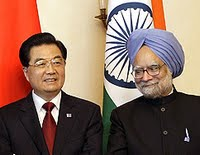For almost 20 years, Indian development has been guided by the "Look East" policy, based on the premise that Asia holds the key to India's economic and strategic future. The recent state visits by Indian President Pratibha Devisingh Patil to Laos and Cambodia, which yielded Indian offers of trade initiatives and cash loans, have demonstrated that, for New Delhi, an eastern orientation is still promising.
Shifting its gaze northward, however, tends to leave India blinking uncomfortably in China's reflected light. Admired but also feared, emulated but also repudiated, China can spoil the appeal of Asia's opportunities for India. Economic ties between the two countries are strengthening -- bilateral trade will surpass $60 billion this year, a twentyfold increase in the span of a decade -- yet China's strategic activities continue to ruffle New Delhi. Chinese military projects near the countries' disputed border leave the Indians questioning Beijing's motives, as do China's overtures to countries like Bangladesh and Sri Lanka, long considered part of India's backyard. As a result, it has become commonplace to hear Indian charges of encroachment and encirclement -- sometimes fair, sometimes overblown -- directed China's way.
In this context, India's courtship of Laos and Cambodia, two countries usually regarded as China's turf, challenges the prevailing view of the Sino-Indian rivalry as one-sided, with Beijing cast as the bully. In Southeast Asia, India is pushing back. Arriving in Laos with a large entourage, Patil proffered a $75 million loan for energy infrastructure projects -- not the first such activity that India has bankrolled there -- as well as expressions of intent from Indian companies, such as Tata, which are keen to take advantage of Laos's cheap labor and abundant resources. The direct result of the Cambodian visit was a small $15 million loan for a rural water project. But at a time when New Delhi and Phnom Penh are poised to ratify a free trade agreement, the presidential escort of 70 Indian business leaders demonstrated India's interest in Cambodia as a future partner.

